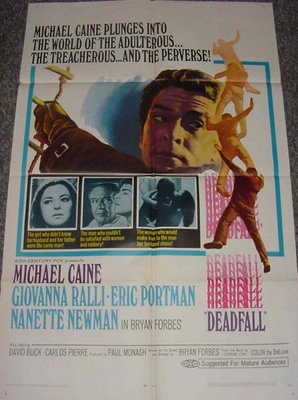
Cast: Michael Caine (Henry), Giovanna Ralli (Fe), Eric Portman (Moreau), Nanette Newman (The Girl), David Buck (Salinas), Leonard Rossiter (Fillmore), Carlos Pierre (Antonio), Vladek Sheybal (Dr Delgado), John Barry (Orchestra Conductor), Renata Tarrago (Solo Guitarist).
Crew: Bryan Forbes (director), Paul Monash (producer), Bryan Forbes (writer), John Barry (music), Gerry Turpin (cinematography), John Jympson (editor), Ray Simm (production designer).
Synopsis: Henry Clarke is an outstanding jewel thief who plans to steal diamonds from a rich man called Salinas. Henry poses an alcoholic to enter a Spanish clinic where Salinas is a patient. Henry is approached by a beautiful woman called Fe on behalf of her ageing husband Moreau. The couple want to collaborate with Henry on stealing Salinas’ diamonds. The thief agrees and moves in with them. Henry and Moreau burgle a private home as a test of how well they work together. Henry begins an affair with Fe, but she refuses to leave her husband – even though Moreau is gay. Fe says Moreau betrayed a lover during the war to save himself from the Nazis. Moreau reveals he is Fe’s biological father, as well as her husband. Henry attempts the Salinas job on his own, but is shot by a guard and falls to his death. Moreau commits suicide. Fe is taken away by the police…
Director Bryan Forbes wrote the screenplay for this £1 million feature, adapting a 1965 novel by Desmond Cory. Production began in the autumn of 1967, with location shooting in Spain and studio work at Pinewood. For Caine, the feature provided a reunion with Forbes and the director’s wife, actress Nanette Newman – the three had worked together on The Wrong Box (1966). It was the first half of a disastrous two-picture contract Caine had agreed with Twentieth Century Fox (the other half was The Magus (1968)).
During filming in Majorca Forbes described Deadfall as a horror story in sunlight. ‘I didn’t want to move into the Hitchcock field, all shadows and gloom,’ the director told Nova magazine. ‘I wanted everything clear and nasty under the sun – horrible because of that. The story’s about a jewel thief, but it’s also about the darker side of human nature: homosexuality and incest. It’s all good clean family fun.’ Forbes predicted Caine’s career would be altered by the movie. ‘This film could open up an entirely new landscape for him. He’s got to escape through one trapdoor to find the next one.’
Caine also felt Deadfall marked a change. ‘This is what I call my first handsome part,’ he told Nova. ‘Alfie and Harry Palmer were either downtrodden or treading on themselves. This character is tougher, more subtly brutal. More like me. I don’t let anyone take liberties with me. Filming’s all right when it’s going well, but when it’s going badly, it’s a bastard. Now I don’t let it bother me – after all the film’s being built round me. It’s how I feel that counts.’
Deadfall’s music was composed by John Barry, a frequent contributor to Caine movies in the 1960s. Unusually, Barry also appeared on screen as conductor of an orchestra. Forbes wrote about this in his 1992 autobiography, A divided life. ‘For Deadfall I asked him [Barry] to give me a guitar concerto of concert-platform standard, for it had to be performed in its entirety by Renata Tarrago and at the same time underline the drama of a robbery – the film being cross-cut between the concert and the working out of the crime.’ Forbes says Barry’s music complemented the picture, instead of swamping what was being shown on screen.
The film was released in the UK during 1968. It received an X rating from the BBFC, restricting entry to those aged 18 and over. Deadfall was panned by critics and a failure at the box office. Its reception was just as harsh in the US, where it was rated R. The film has never been released on VHS or DVD. [Update: In fact Deadfall was released on Region 1 DVD in the US during October 2006.]
Reviews: ‘The principal protagonists move like so many somnambulists through the turgid labyrinth of Bryan Forbes’ latest film, with Michael Caine’s performance … directly belying the emotional excesses attributed to him in the script.’ – MFB
‘An apparent attempt to pull off an Alfred Hitchcock suspenser, with added Freudian schleps, Deadfall falls dead as little more than ponderous, tedious trivia.’ – Variety
Verdict: Deadfall makes two hours seem so much longer. The three central characters talk and talk without saying anything of consequence. Since Forbes wrote and directed this, he must take the blame. Cinema is a visual artform, yet this film constantly has people talking about events instead of showing them. Everyone answers questions with more questions and melodrama crushes any real drama. Whenever the inaction flags, Forbes cuts away to an image of waves crashing on a stony beach or seagulls squawking overhead. In the midst of all this Caine is lost, unsure of how to pitch his performance and – unusually – unable to create a hint of empathy for his character. This film comes alive only during the cross-cut sequence of theft and concerto, which owes much to the classic French caper film Rififi (1954). Otherwise, Deadfall is a dead loss.
1 comment:
Quite a feat to manage a whole review of Deadfall without mentioning Eric Portman. He is as always brilliant.
Post a Comment